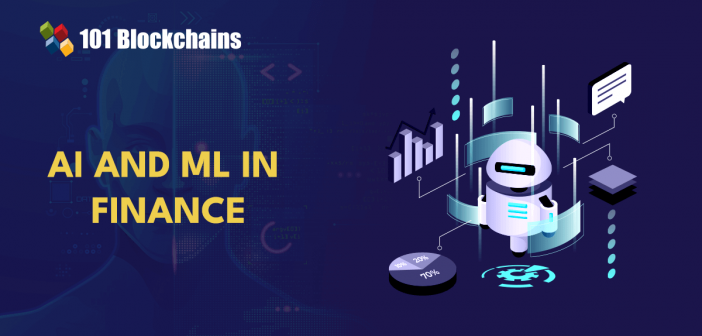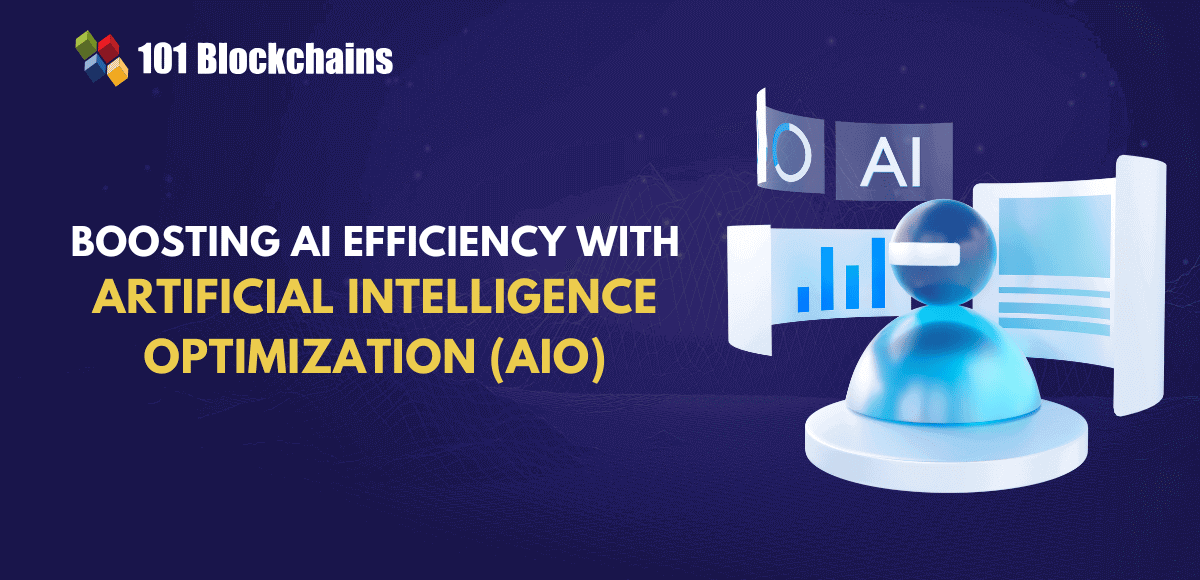Learn how blockchain truly works, master key definitions, and uncover what makes smart contracts so "smart." Dive into the fundamentals, gain valuable insights, and start your blockchain journey today!

- AI & ChatGPT
Georgia Weston
- on December 22, 2023
AI and ML in Finance: Reshaping the Future of Banking and Investments
Artificial intelligence has been responsible for introducing transformative changes across a broad range of industries. Interestingly, the applications of AI and ML in finance have also gained momentum. AI can help in creating intelligent machines that can perform different tasks by simulating human intelligence. It can leverage algorithms for analysis of data and learning from patterns to make relevant predictions or decisions.
Advancements in the field of natural language processing and machine learning have enabled AI to introduce promising value advantages of personalization, customer service, fraud detection, and risk management. On the other hand, the rising adoption of AI in the domain of banking and investment has also created concerns regarding data privacy and regulations. Let us learn more about the role of AI in the field of banking and investment markets.
Impact of AI and ML in Finance Services Industry
The best way to find answers to “What is the role of AI and ML in banking sector?” would point to exploring the fundamental implications of AI for transformative impact. As the domain of AI continues evolving, different types of AI have found applications in multiple industries. Different types of AI technologies, such as machine learning, computer vision, and natural language processing, could transform various industries. Machine learning has gained significant traction in the banking and financial services industry.
The use of AI in finance and banking services could help in achieving the benefits of precise fraud detection. AI-powered algorithms could analyze massive amounts of data to identify possibilities for fraudulent activity. As a result, financial institutions could avoid the loss of massive volumes of money and also prevent losses for customers.
AI has also emerged as a valuable tool for risk management, particularly for the evaluation of credit risks. The analysis of data associated with credit history alongside other factors could help AI in drawing accurate credit risk assessments. Therefore, financial institutions could make data-driven decisions for lending.
The impact of machine learning and AI in finance also points to the ways in which they can transform customer service in the banking and investment industry. For example, virtual assistants and chatbots powered by AI could help in offering faster and more efficient solutions to customer problems. Most important of all, AI could guarantee the provision of personalized solutions in the banking and financial services industry.
How Will AI and ML Transform the Banking and Investments Sector?
Artificial intelligence and machine learning could serve as major transformative forces in the domain of finance for more than a decade. In the initial stages, the applications of AI and machine learning in finance focused on automation for performing simple tasks. Now, AI has become one of the complex technologies that offer the value of sophisticated data interpretation and predictive analytics.
Big financial institutions such as Bank of America, JPMorgan Chase and Wells Fargo have used AI and ML for improving operational efficiency and customer experiences. Here are some of the prominent highlights that showcase the impact of AI and ML in the banking and financial services industry.
-
Better Customer Experiences
One of the most common highlights in every guide on the future of AI in banking would focus on improvement of customer experiences. How can AI and ML help customers in the banking and financial services industry with better experiences? AI and ML could help in analysis of massive volumes of customer data, which opens the doors for hyper-personalization of banking services.
An effective understanding of customer behavior, financial goals, and spending patterns could help in offering personalized product recommendations and financial advice. The customization of services according to the needs and preferences of customers helps in improving the banking experience. As a result, financial institutions could register higher levels of customer satisfaction alongside nurturing long-term customer relationships.
The impact of artificial intelligence in banking sector for offering better customer experiences also points to biometric recognition systems. Integration of AI with biometric technologies such as fingerprint scanning and facial recognition has improved the security of digital banking.
Biometric recognition systems can ensure a secure and seamless authentication process, thereby reducing the possibility of identity theft. It can play a crucial role in improving customer experiences in the banking and investments sector with the assurance of security.
Another promising contribution of AI and ML for better user experiences in banking sector involves the use of chatbots and virtual assistants. Chatbots driven by AI and ML could offer round-the-clock support with instant and relevant responses. In addition, chatbots and virtual assistants could also leverage machine learning to execute simple tasks with real-time interactions. As a result, financial institutions could reallocate human customer service agents to other crucial tasks for serving customers effectively.
Excited to learn the fundamentals of AI applications in business? Enroll now in the AI For Business Course
-
Improved Automation and Efficiency
The review of the effects of AI and ML in finance would also draw attention towards better automation and efficiency. Where can you find the best value of automation and efficiency in banking and investment sector? The automation of routine tasks through AI and ML could provide a competitive advantage to businesses in the banking and investments industry.
For example, AI and ML could help in automation of routine tasks such as account setup, data entry, report generation, and credit scoring. Artificial intelligence could support the automation of such tasks for increasing efficiency and reducing errors. In addition, it can also help employees of financial institutions in focusing on complex and more important tasks.
Another formidable advantage of automation and efficiency through use of AI in finance is the assurance of faster credit decisions. The traditional approach followed for reaching credit decisions is extremely slow as it involves a manual review of the financial history, income and credit score of the applicant.
AI and ML could help speed up the process of credit assessment through faster analysis of financial data, past transactions, and other parameters. The applications of AI and ML in credit scoring not only speed up the process but also ensure more accuracy. As a result, financial institutions could use AI and ML as valuable tools for avoiding credit risks.
-
Safeguards against Fraud
The financial services sector has been plagued with different types of fraud. With the growing use of artificial intelligence and ML in finance, organizations could find better safeguards against fraud. AI systems could help in continuous monitoring and analysis of transactions to identify unusual patterns that indicate fraudulent activity.
For example, AI systems can detect frequent transactions within a limited timeframe, unexplained large volumes of transactions, and transactions from unexpected locations. The effective, accurate, and timely identification of such anomalies can help banks and other financial institutions in taking preventive actions.
Another promising advantage of the use of AI and ML in financial institutions points to the assurance of real-time fraud prevention. The answers to “What is the role of AI and ML in banking sector?” would emphasize the limitations of traditional fraud detection systems. The traditional systems generally provide notifications to the bank or customer after a fraudulent activity has done the damage.
On the contrary, AI-powered fraud detection systems could ensure real-time detection and reporting of anomalies. AI systems would not only flag fraudulent transactions but also block the transaction temporarily. The systems would also report the transaction immediately to the customer and banks to reduce the impact of the fraud.
How Have Organizations Embraced AI and ML in Finance Industry?
The impact of artificial intelligence in banking sector provides a clear impression of the future of artificial intelligence and machine learning for financial institutions. You must be curious about the existing state of adoption of AI and ML in the financial services sector. Interestingly, the examples of successful AI implementation in banking and financial service organizations could help you understand the potential of AI and ML for transforming the banking sector.
One of the most notable examples among financial institutions that have embraced AI is JP Morgan. It has utilized AI for different purposes, such as fraud detection, customer service, and risk management. The Contract Intelligence platform of JP Morgan leverages machine learning to extract data from legal documents. As a result, it could reduce the time and resources required in manual processing.
Bank of America is another top example that shows a glimpse of the future of AI in banking with an interesting use case. The premier financial institution has used AI to improve its customer service operations by using chatbots. The AI-powered chatbots help Bank of America in responding to routine customer queries. It has helped the bank in reallocating its human resources to more complex problems. Therefore, Bank of America has successfully achieved improvement in customer satisfaction alongside offering faster response times.
Some of the other examples of financial institutions that have understood the value of machine learning and AI in finance are Capital One and Citigroup. Citigroup has leveraged AI for credit scoring which has helped the organization with more accurate and faster credit decisions. On the other hand, Capital One has used AI to offer personalized investment recommendations to customers according to their transaction history.
Want to understand the importance of ethics in AI, ethical frameworks, principles, and challenges? Enroll now in Ethics Of Artificial Intelligence (AI) Course
How Will AI and ML Affect Workforce Management in Banking Sector?
The effect of AI and ML on service delivery and user experiences in the banking and investment sector provides a glimpse of their potential. You should also notice the value benefits of AI and ML in finance for transforming workforce management in banking and financial services sector. Here are some of the prominent ways in which AI and ML can revolutionize workforce management in financial services sector.
- Effective use of AI for hiring.
- AI and ML could also help in reskilling and upskilling the workforce.
- AI-powered workforces could offer better productivity.
- Facility of new opportunities for career development.
Understand the true potential of generative AI and become an expert with the Generative AI skill path
What is the Future of AI and ML in Banking and Investment Sector?
The future of AI in banking has also been one of the notable topics of discussion regarding the implications of AI and ML for financial institutions. You can expect the following trends in the effect of AI and ML on finance.

-
AI-powered Financial Planning
The foremost trend in the future of AI and ML applications for banking sectors would revolve around financial planning. AI could help customers and organizations with effective financial planning through a comprehensive analysis of different data points. The effective assessment of parameters such as income, expenses, investment patterns, and savings could help in drawing personalized advice for investment. It could help in revolutionizing financial management with easier access to financial planning.
-
Challenges of Regulations and Ethics
Another prominent aspect that would emerge in the future of machine learning in finance would be regulatory challenges. Regulatory authorities should create new guidelines for ensuring responsible and ethical use of AI. In addition, it is also important to focus on the issues of transparency in AI decision-making, security, and data privacy. Furthermore, banking and financial service organizations must also pay attention to the possibility of displacement of jobs due to AI.
-
Integration with Blockchain and New Technologies
The most noticeable aspect of the use of AI and ML for transforming the financial services sector would point to possibilities for integration with new technologies. For example, blockchain technology could provide an additional layer of security by preventing the concerns of data tampering. In addition, integration of AI systems in banking with new technologies such as IoT and 5G could also improve the efficiency, customer experience and efficiency of organizations in the financial sector.
-
Advanced Predictive Analytics
The impact of artificial intelligence in banking sector revolves primarily around the value of analytics. Interestingly, machine learning models have become more sophisticated, thereby leading to the rise of advanced predictive analytics. It can help in improving risk management and personalization of financial products and advice for customers.
Excited to learn about ChatGPT and other AI use cases? Enroll now in the ChatGPT Fundamentals Course
Conclusion
The outline of the different ways to use machine learning and AI in finance showcases their transformative impact. Financial services would become more accessible to customers with the element of personalization. Customers could not only find personalized financial products and advice but also enjoy the benefits of security. Learn more about the value of artificial intelligence and machine learning for transforming other industries right now.







